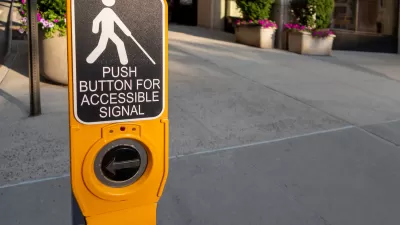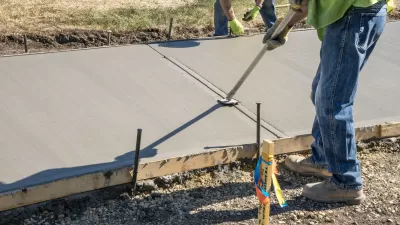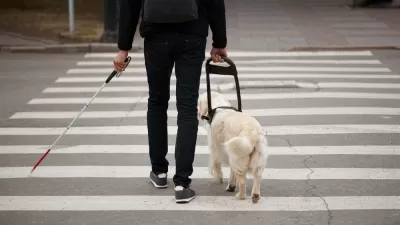The city plans to make improvements to pedestrian infrastructure and bring its public streets into compliance with the Americans with Disabilities Act.

Asheville, North Carolina plans to improve its pedestrian infrastructure and Americans with Disabilities Act (ADA) compliance through a plan known as Close the GAP, which the city council approved on Tuesday night. In an article for WLOS, Andrew James highlights the plan’s main focus areas.
The document is designed as “a high level plan that’s more of a guiding document that we'll work with internally to help us prioritize our projects,” according to Lucy Crown, the city’s transportation planning manager. As James explains, “The plan took nearly three years to develop, using studies of the city’s corridors and pedestrian infrastructure, identifying priority areas where improvements are needed.”
The plan outlines “extensive” ADA improvements that would cost an estimated $101 million to complete to bring the city into full ADA compliance. “This work includes sidewalk repairs, curb ramp upgrades, signalized intersections, greenway upgrades and ADA retrofits, as well as improvements to transit stops.”
FULL STORY: Asheville sets out to make city more ADA compliant, strengthen pedestrian network

Maui's Vacation Rental Debate Turns Ugly
Verbal attacks, misinformation campaigns and fistfights plague a high-stakes debate to convert thousands of vacation rentals into long-term housing.

Planetizen Federal Action Tracker
A weekly monitor of how Trump’s orders and actions are impacting planners and planning in America.

In Urban Planning, AI Prompting Could be the New Design Thinking
Creativity has long been key to great urban design. What if we see AI as our new creative partner?

King County Supportive Housing Program Offers Hope for Unhoused Residents
The county is taking a ‘Housing First’ approach that prioritizes getting people into housing, then offering wraparound supportive services.

Researchers Use AI to Get Clearer Picture of US Housing
Analysts are using artificial intelligence to supercharge their research by allowing them to comb through data faster. Though these AI tools can be error prone, they save time and housing researchers are optimistic about the future.

Making Shared Micromobility More Inclusive
Cities and shared mobility system operators can do more to include people with disabilities in planning and operations, per a new report.
Urban Design for Planners 1: Software Tools
This six-course series explores essential urban design concepts using open source software and equips planners with the tools they need to participate fully in the urban design process.
Planning for Universal Design
Learn the tools for implementing Universal Design in planning regulations.
planning NEXT
Appalachian Highlands Housing Partners
Mpact (founded as Rail~Volution)
City of Camden Redevelopment Agency
City of Astoria
City of Portland
City of Laramie





























